 An international human rights group has accused the Syrian military of committing war crimes just before a ceasefire came into effect on 12 April.
An international human rights group has accused the Syrian military of committing war crimes just before a ceasefire came into effect on 12 April.
Human Rights Watch says fighting around Idlib province, in the north, may meet the definition of an “armed conflict”, as laid down by international law.
All forces engaged in armed conflict have to comply with internationally agreed minimum standards of conduct.
Separately, activists said 15 soldiers had been killed in a rebel ambush.
The attack occurred at dawn near the village of al-Rai, in Aleppo province, where the military had “scaled up” operations since the ceasefire came into force, the Syrian Observatory for Human Rights said.
Two members of the rebel Free Syrian Army also died, it added.
Another six soldiers were reportedly killed in clashes near Damascus.
Russia said it “decisively” condemned the “new terrorist sorties”.
Rebel groups, a foreign ministry statement said, had “unleashed a large-scale campaign to destabilise the situation and disrupt” the peace plan negotiated by the UN and Arab League special envoy, Kofi Annan.
The Local Co-ordination Committees, an activist network, said 10 people had been killed by security forces across the country on Wednesday, and 800 since the government agreed to Mr Annan’s plan on 27 March.
“These numbers were verified in the context of 2,400 breaches of the ceasefire by the regime’s army and shabiha [militia],” it added.
‘Broken promises’
Human Rights Watch, which is based in New York, said there was clear evidence Syria breached the international laws governing armed conflicts by carrying out summary executions and destroying houses as the negotiations that led to the 12 April ceasefire continued.
The group said the Syrian army killed at least 95 civilians and burned or destroyed hundreds of houses during a two-week offensive in Idlib province in late March and early April.
“It was as if the Syrian government forces used every minute before the ceasefire to cause harm,” said Anna Neistat, associate director for program and emergencies at HRW. “Syrian tanks and helicopters attacked one town in Idlib after another.”
The 38-page report, ‘They Burned My Heart’: War Crimes in Northern Idlib During Peace Plan Negotiations, documents dozens of executions, killings of civilians, and destruction of civilian property that qualify as war crimes, as well as detention without trial and torture.
It includes accounts of children being executed by government forces.
“The security forces also arbitrarily detained dozens of people, holding them without any legal basis,” HRW said.
“About two-thirds of the detainees remain in detention to date, despite promises by President Bashar al-Assad’s government to release political detainees,” it added.
The HRW report told how the mother of Mohammed Saleh Shamrukh – an anti-government protester from Idlib province – had to watch security forces take him away.
“I didn’t say goodbye so as to not make him sad. He didn’t say anything either. When they left, the soldiers said I should forget him,” she said.
Mr Shamrukh was executed on March 25, according to HRW.
The 12 April ceasefire is a key element of the peace plan brokered by Mr Annan. Levels of violence have declined since it came into force.
But UN monitors who are now deployed to Syria report that clashes are continuing, and that both sides continue to have heavy weaponry in civilian areas, in breach of their ceasefire obligations.
The Syrian government has not commented on the HRW report.
Officials blame foreign-backed “terrorist” groups for the violence and for killing more than 2,450 civilians and 1,340 members of the security forces since protests against President Bashar al-Assad began in March 2011. The UN estimates that more than 9,000 people have been killed.
BBC
Case study – ‘They burned my house’
Taftanaz, Idlib province, 3-4 April:
One woman told how government forces entered her home searching for her husband.
“They put a Kalashnikov to my head and threatened to kill us all if my husband did not come home,” she said.
“Then an officer told a soldier to get petrol and told my children that he would burn them, just as he would burn their father, because he is a terrorist.”
She recounted how she was finally allowed to leave the house just before it was burned down on 4 April, along with the houses of her five brothers-in-law.
In the same assault 19 members of the Ghazal family, including two under the age of 18, were executed by regime forces.
And a 76-year-old man identified as Ali Maassos was also shot and killed with his wife Badrah as they tried to escape from Taftanaz.
Source: Human Rights Watch

Leave a Reply
You must be logged in to post a comment.